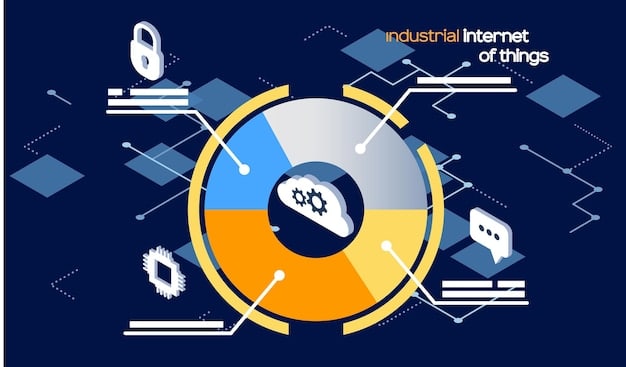Understanding the New FCC Data Privacy Regulations for Tech Companies

New FCC Regulations on Data Privacy: What Tech Companies Need to Know Now are being updated to address the evolving digital landscape, compelling tech companies to adapt their data handling and security practices to protect consumer information.
The digital world is evolving, and so are the regulations that govern it. The new FCC regulations on data privacy: What tech companies need to know now is critical for staying compliant and maintaining consumer trust. Let’s dive in!
Understanding the FCC’s Authority on Data Privacy
The FCC, or Federal Communications Commission, plays a vital role in overseeing communications within the United States. While primarily known for regulating broadcast and telecommunications, its authority extends into data privacy, particularly concerning internet service providers (ISPs) and the data they handle.
The Historical Scope of FCC Data Privacy Regulations
Traditionally, the FCC had broad authority over ISPs. This included the ability to set rules regarding how ISPs could collect, use, and share consumer data. These regulations were designed to ensure that sensitive information remained protected, offering consumers a level of control over their data.
Shifting Landscape and Jurisdictional Changes
However, the landscape has shifted in recent years. There have been legislative and court challenges that have altered the FCC’s authority. For instance, Congress passed legislation in 2017 that rolled back some of the FCC’s privacy rules for ISPs, allowing them to share customer data with third parties more easily. Additionally, there have been ongoing debates about whether the FCC or the Federal Trade Commission (FTC) should have primary oversight of data privacy for tech companies.

This shifting landscape necessitates that tech companies remain vigilant and informed. Understanding the FCC’s current authority and how it interacts with other regulatory bodies is crucial for maintaining compliance and protecting consumer data. As the regulatory environment evolves, companies must adapt their strategies to meet changing requirements and expectations.
In conclusion, while the FCC’s authority has seen changes, it remains a key player in data privacy, particularly for ISPs. Staying informed about these regulations and their potential impact is essential for tech companies to navigate the complex world of data privacy.
Key Elements of the New FCC Regulations
The new FCC regulations on data privacy are designed to address gaps in existing laws and to reflect the current digital landscape. These regulations focus on providing consumers with greater control over their personal information and enhancing the security of data handled by tech companies.
Transparency Requirements for Data Collection
One of the core elements is the increased emphasis on transparency. Tech companies will need to provide clear and understandable information about what data they collect, how it is used, and with whom it is shared. This means avoiding complex legal jargon and being upfront with consumers about their data practices.
Consent and Control Mechanisms for Consumers
Consumers are gaining more control over their data through enhanced consent mechanisms. Companies must obtain explicit consent before using sensitive data for purposes beyond what is necessary to provide the service. This includes using data for targeted advertising or sharing it with third parties. Consumers will also have the right to access, correct, and delete their personal data.
Data Security and Breach Notification Protocols
The new regulations include stricter data security requirements. Tech companies must implement reasonable security measures to protect consumer data from unauthorized access and breaches. In the event of a data breach, companies will be required to notify affected consumers promptly and provide information about the nature of the breach and steps they are taking to mitigate the damage.
- Enhanced Transparency: Clear, understandable privacy policies are essential.
- Consent is Key: Obtain explicit consent for data usage beyond essential services.
- Robust Security: Implement strong security measures to protect data.
- Breach Notification: Notify consumers promptly in case of a data breach.
In summary, the new FCC regulations aim to empower consumers with more control over their data and to hold tech companies accountable for protecting that data. By focusing on transparency, consent, and security, these regulations seek to create a more trustworthy digital environment.
How the New Regulations Impact Tech Companies
The new FCC regulations on data privacy necessitate significant adjustments for tech companies. From adapting data collection practices to enhancing security protocols, the impact is wide-ranging and demands a comprehensive response.
Required Changes to Data Collection Practices
Tech companies must review and update their data collection practices to comply with the new regulations. This includes minimizing the amount of data collected, being transparent about the reasons for data collection, and obtaining explicit consent for using data in ways that are not essential to the service provided. Companies will also need to provide consumers with easy-to-use tools to access, correct, and delete their data.
Upgrading Data Security Protocols
Enhancing data security is another critical step. Companies must implement robust security measures to protect consumer data from unauthorized access and breaches. This includes using encryption, conducting regular security audits, and training employees on data security best practices.
Compliance Costs and Resource Allocation
Compliance with the new regulations will involve costs. Companies may need to invest in new technologies, hire additional staff, and conduct regular compliance audits. However, these costs are justified by the need to protect consumer data and maintain trust.

Adapting to these regulations requires tech companies to prioritize data privacy and security. By making the necessary changes, companies can not only comply with the law but also build stronger relationships with their customers based on trust and transparency.
In conclusion, the impact of the new FCC regulations on tech companies is significant, requiring changes in data collection, security, and resource allocation. Embracing these changes is essential for compliance and maintaining consumer trust.
Strategies for Tech Companies to Ensure Compliance
Navigating the new FCC regulations requires a proactive and strategic approach. Tech companies must implement specific strategies to ensure compliance and to protect consumer data effectively.
Conducting a Data Privacy Audit
The first step is to conduct a comprehensive data privacy audit. This involves reviewing all existing data collection and usage practices to identify areas of non-compliance. The audit should also assess the effectiveness of current security measures and identify potential vulnerabilities.
Developing and Implementing a Compliance Plan
Based on the findings of the data privacy audit, companies should develop and implement a detailed compliance plan. This plan should outline specific steps to address any gaps in compliance and to ensure ongoing adherence to the new regulations. The plan should include timelines, responsibilities, and metrics for measuring progress.
Training Employees on Data Privacy Best Practices
Employee training is crucial. All employees should be trained on data privacy best practices and on the specific requirements of the new FCC regulations. Training should cover topics such as data collection, consent, security, and breach notification procedures. Regular refresher courses can help to keep employees up-to-date on any changes to the regulations.
- Regular Audits: Conduct frequent data privacy audits to stay on top of compliance.
- Build a Plan: Develop a detailed compliance plan with specific steps and timelines.
- Train Your Team: Ensure all employees are trained on data privacy best practices.
By taking these steps, tech companies can demonstrate a commitment to data privacy and can build trust with their customers. A proactive approach to compliance is not only a legal requirement but also a smart business strategy.
In summary, strategies for compliance include conducting audits, developing a compliance plan, and training employees. These efforts are essential for navigating the new FCC regulations effectively.
Enforcement and Penalties for Non-Compliance
Understanding the enforcement mechanisms and penalties for non-compliance is crucial for tech companies. The FCC has the authority to investigate violations of its data privacy regulations and to impose significant penalties.
The FCC’s Enforcement Powers
The FCC can conduct investigations, issue subpoenas, and hold hearings to gather information about potential violations. If the FCC finds that a company has violated its data privacy regulations, it can issue cease and desist orders, impose fines, and require the company to implement corrective measures.
Potential Fines and Legal Repercussions
The fines for non-compliance can be substantial. In addition to monetary penalties, companies may face legal repercussions, including lawsuits from consumers and shareholders. The reputational damage from a data privacy violation can also be significant, leading to a loss of customers and revenue.
Case Studies of Data Privacy Violations
Several high-profile cases illustrate the potential consequences of data privacy violations. These cases serve as a reminder of the importance of complying with data privacy regulations and of the potential risks of non-compliance.
Compliance with the new FCC regulations is not just a legal obligation; it is also a business imperative. Companies that prioritize data privacy are more likely to maintain the trust of their customers and to avoid the costly consequences of non-compliance.
In conclusion, understanding the FCC’s enforcement powers and the potential penalties for non-compliance is essential for tech companies. Prioritizing data privacy is key to avoiding these consequences and maintaining consumer trust.
The Future of Data Privacy Regulations
The landscape of data privacy regulations is constantly evolving. As technology advances and new privacy challenges emerge, we can expect to see further changes in the regulatory environment. Staying informed about these trends is essential for tech companies.
Anticipated Changes in FCC Regulations
The FCC is likely to continue updating its data privacy regulations to address emerging privacy challenges. This could include regulations related to artificial intelligence, IoT devices, and other new technologies. We can also expect to see increased coordination between the FCC and other regulatory bodies, such as the FTC, to create a more comprehensive approach to data privacy.
The Role of Emerging Technologies in Shaping Data Privacy
Emerging technologies are playing a significant role in shaping data privacy regulations. As AI and IoT devices become more prevalent, there will be a growing need to address the privacy risks associated with these technologies. This could include regulations related to the collection, use, and sharing of data generated by AI and IoT devices.
Preparing for Future Compliance Challenges
To prepare for future compliance challenges, tech companies should invest in data privacy expertise, stay informed about regulatory developments, and implement flexible data governance policies. This will enable them to adapt quickly to changing requirements and to maintain compliance in an evolving regulatory environment.
In summary, the future of data privacy regulations will be shaped by emerging technologies and evolving privacy challenges. Tech companies that stay informed and adapt their practices accordingly will be best positioned to maintain compliance and to protect consumer data.
| Key Aspect | Brief Description |
|---|---|
| 🔒 Transparency | Provide clear information about data collection and usage. |
| ✅ Consent | Obtain explicit consent for non-essential data usage. |
| 🛡️ Security | Implement robust measures to protect user data. |
| 🚨 Breach Notification | Promptly notify users about data breaches. |
FAQ
The new regulations aim to enhance consumer control and protection over their personal data by requiring greater transparency, consent mechanisms, and data security from tech companies.
These regulations primarily affect tech companies that collect, process, and store consumer data, including internet service providers, social media platforms, and app developers.
Companies should conduct data privacy audits, develop compliance plans, train employees, and implement robust data security measures to ensure adherence to the new regulations.
Non-compliance can result in substantial fines, legal repercussions, and reputational damage, leading to a loss of customer trust and revenue for the company.
Future regulations are expected to address emerging technologies like AI and IoT, with increased coordination among regulatory bodies for comprehensive data privacy protection.
Conclusion
The new FCC regulations on data privacy represent a significant shift in how tech companies must handle consumer data. By understanding the key elements, adapting current practices, and implementing proactive compliance strategies, companies can not only meet regulatory requirements but also build stronger, more trusting relationships with their customers. Staying informed and adaptable is crucial for navigating the evolving landscape of data privacy.





